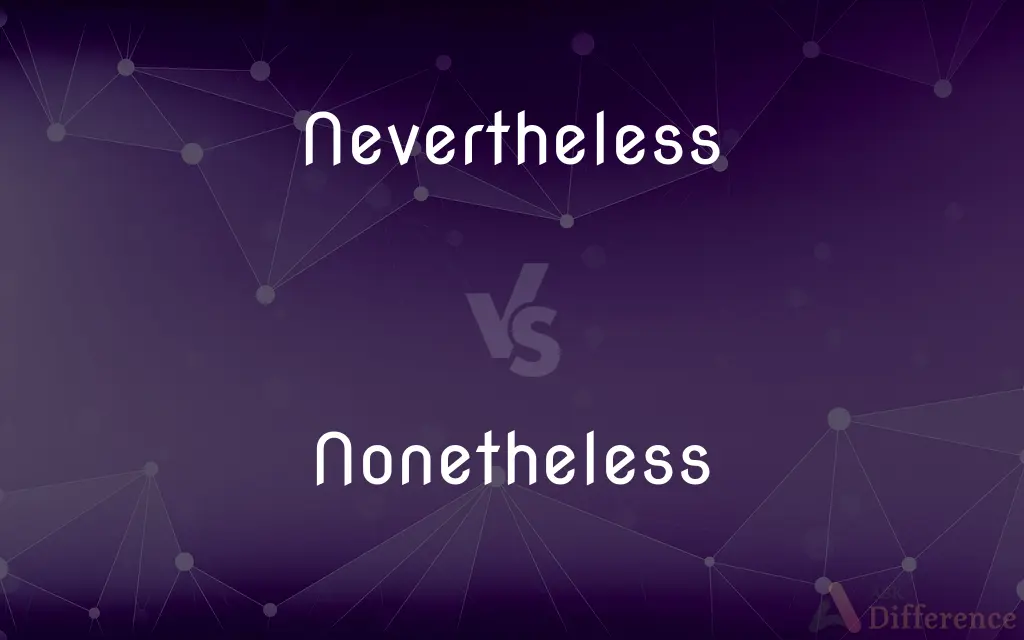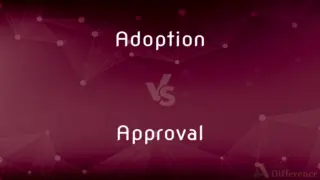Nevertheless vs. Nonetheless — What's the Difference?
By Fiza Rafique & Urooj Arif — Updated on April 15, 2024
"Nevertheless" emphasizes continuation or contrast in a situation, while "nonetheless" indicates a concession or affirmation despite obstacles.

Difference Between Nevertheless and Nonetheless
Table of Contents
ADVERTISEMENT
Key Differences
Nevertheless" is commonly used to signal a contrast or counterpoint within an ongoing argument or narrative, often bridging two statements that might seem contradictory. On the other hand, "nonetheless" serves a similar function but with a slightly stronger emphasis on the conclusion or result being undeterred by preceding facts.
When "nevertheless" is used, it typically appears in more formal or academic writing, subtly introducing a contrasting point that acknowledges complexity. Whereas "nonetheless" appears in contexts that are equally formal, but suggests a stronger continuation from the previous statement, reinforcing the speaker's stance despite potential counterarguments.
"Nevertheless" can often be found linking more closely related ideas, providing a smoother transition in discourse. In contrast, "nonetheless" might be used when the contrast is more stark or surprising, giving it a slightly more emphatic tone.
In terms of placement, "nevertheless" is versatile, comfortably fitting at the start, middle, or end of a sentence. Nonetheless, while also flexible, is often most effective when used at the beginning of a sentence to immediately signal a rebuttal or continuation.
Usage trends show "nevertheless" as slightly more prevalent in British English compared to American English. Nonetheless, "nonetheless" is widely recognized and used in both dialects, maintaining a robust presence in formal communication across the English-speaking world.
ADVERTISEMENT
Comparison Chart
Function
Signals contrast or continuation
Emphasizes affirmation despite facts
Usage Context
More formal, academic writing
Slightly emphatic, formal contexts
Idea Connection
Links closely related ideas
Used with stark or surprising contrast
Sentence Placement
Start, middle, or end
Often at the beginning
Prevalence in Dialects
More common in British English
Common in both British and American English
Compare with Definitions
Nevertheless
As a marker of perseverance.
She knew the odds were against her; nevertheless, she persisted.
Nonetheless
To highlight a rebuttal or counter-argument.
He made a good point; nonetheless, I disagreed.
Nevertheless
As a transition word indicating contrast.
He was very tired; nevertheless, he continued working.
Nonetheless
Common in business and formal discussions.
There were objections; nonetheless, the proposal was approved.
Nevertheless
For connecting two contradictory statements.
It was a known fact; nevertheless, some doubted it.
Nonetheless
To reinforce determination or resolve.
His chances were slim; nonetheless.he remained hopeful.
Nevertheless
To introduce an opposing point.
The plan was risky; nevertheless, it was the only option.
Nonetheless
As a word affirming continuation despite challenges.
The conditions were harsh; nonetheless, the team succeeded.
Nevertheless
In academic writing to acknowledge a concession.
This theory has flaws; nevertheless, it's widely accepted.
Nonetheless
For emphasizing unexpected outcomes.
The data was incomplete; nonetheless, the results were valid.
Nevertheless
In spite of that; nonetheless; however
A small, nevertheless fatal error.
Nonetheless
Nevertheless; however.
Nevertheless
(conjunctive) In spite of what preceded; yet.
Nonetheless
(conjunctive) Nevertheless.
Nevertheless
Not the less; notwithstanding; in spite of that; yet.
No chastening for the present seemeth to be joyous, but grievous; nevertheless, afterward it yieldeth the peaceable fruit of righteousness.
Nonetheless
Despite anything to the contrary (usually following a concession);
Although I'm a little afraid, however I'd like to try it
While we disliked each other, nevertheless we agreed
He was a stern yet fair master
Granted that it is dangerous, all the same I still want to go
Nevertheless
Despite anything to the contrary (usually following a concession);
Although I'm a little afraid, however I'd like to try it
While we disliked each other, nevertheless we agreed
He was a stern yet fair master
Granted that it is dangerous, all the same I still want to go
Common Curiosities
Can 'nevertheless' and 'nonetheless' be used interchangeably?
Generally, yes, they can be used interchangeably, though subtle differences in tone and emphasis may apply.
Does 'nonetheless' imply a stronger contrast than 'nevertheless'?
Yes, 'nonetheless' often implies a stronger or more emphatic contrast than 'nevertheless'.
Is 'nevertheless' more formal than 'nonetheless'?
Yes, 'nevertheless' is often considered slightly more formal than 'nonetheless'.
What type of writing is 'nonetheless' best suited for?
'Nonetheless' is well-suited for formal writing, including academic and business contexts.
Where is 'nevertheless' commonly placed in a sentence?
'Nevertheless' can be placed at the beginning, middle, or end of a sentence.
Are there any restrictions on the use of 'nevertheless' and 'nonetheless' in a sentence?
There are no strict restrictions, but it is best to use them to connect ideas that hold some level of contrast.
Can 'nevertheless' start a sentence?
Yes, 'nevertheless' can effectively start a sentence to introduce a contrasting idea.
What is the impact of using 'nonetheless' at the beginning of a sentence?
It immediately signals a continuation or affirmation, setting a strong tone for the statement that follows.
How do 'nevertheless' and 'nonetheless' affect the tone of academic writing?
They add a formal tone and are useful for structuring arguments by showing contrasts or unexpected continuations.
Are these terms used differently in British vs. American English?
'Nevertheless' is more common in British English, while 'nonetheless' is frequently used in both dialects.
Share Your Discovery

Previous Comparison
Adoption vs. Approval
Next Comparison
Alert vs. VigilantAuthor Spotlight
Written by
Fiza RafiqueFiza Rafique is a skilled content writer at AskDifference.com, where she meticulously refines and enhances written pieces. Drawing from her vast editorial expertise, Fiza ensures clarity, accuracy, and precision in every article. Passionate about language, she continually seeks to elevate the quality of content for readers worldwide.
Co-written by
Urooj ArifUrooj is a skilled content writer at Ask Difference, known for her exceptional ability to simplify complex topics into engaging and informative content. With a passion for research and a flair for clear, concise writing, she consistently delivers articles that resonate with our diverse audience.














































